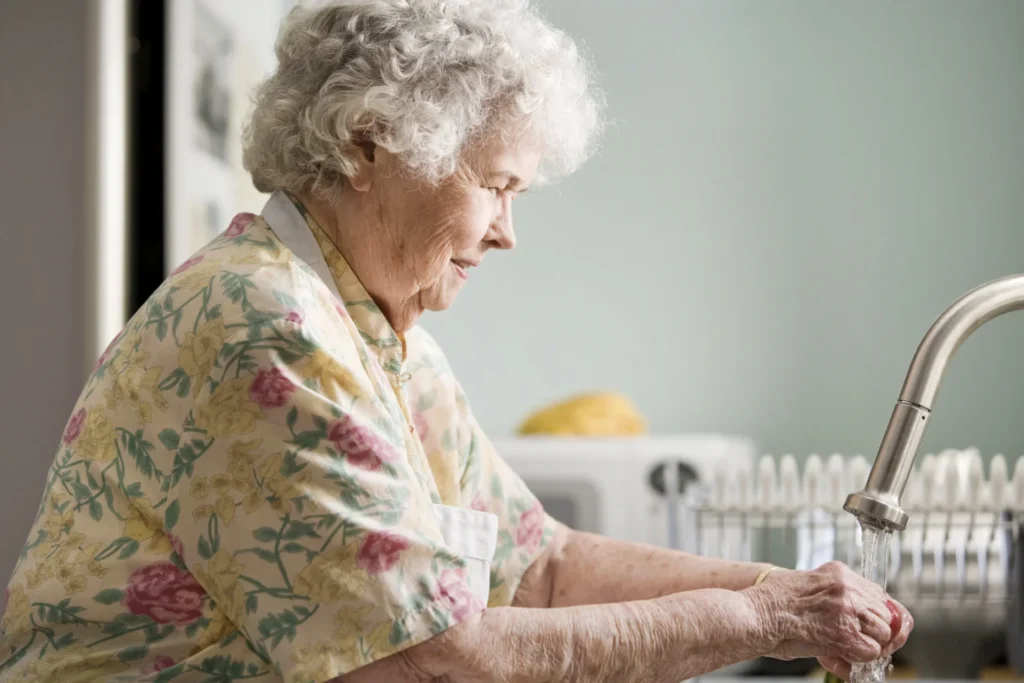Dementia and Hygiene
September 2, 2024
When you think of dementia, you might automatically think of memory loss. While memory loss and confusion is certainly a hallmark symptom of dementia, there are many other symptoms that can affect daily life as well. For example, people living with dementia can make poor decisions, choosing to wear a winter coat outside in the summertime, or they might pace so much that they don’t sit down to eat nutritious meals three times per day. Unfortunately, dementia can present many challenges to the person living with the condition and to their loved ones.


For loved ones of those living with dementia, they can be startled at how they notice their loved one’s hygiene decline rapidly. A lack of attention to hygiene is a common side effect of cognitive decline. Here’s what you need to know, along with potential solutions.
Poor Hygiene and Dementia
Adults living with dementia can struggle with maintaining their personal preferences for hygiene. A woman, for example, who has always dressed to impress with coordinating outfits, perfect hair, and full make-up, can struggle with the complex process of getting ready each morning. She might find that she gets distracted when she sees all of her makeup supplies or feels overwhelmed and overstimulated when she opens up her closet.
Keeping up with showering, bathing, dressing, and grooming takes a lot of decision-making and judgment. Unfortunately, someone living with dementia simply may not have the capacity to take on these complex tasks. This results in them skipping tasks altogether or choosing a less overwhelming option.
If your mom was always dressed to the nines and is now wearing mismatched sweatpants and sweatshirts, it can point to cognitive decline and is a side effect of her dementia.
Dangers of Poor Hygiene
While decreased attention to hygiene can leave family members feeling confused, poor hygiene can also be quite dangerous for the person living with dementia. The biggest danger of poor hygiene is skin integrity. Skin breakdown can happen quickly if a senior is not taking care of their hygiene, especially if they are incontinent or are not showering often.
Skin breakdown can lead to open wounds that can be difficult to heal. In addition, rashes or dry patches of skin can cause itching, which can lead to skin tears. Finally, poor skin integrity can make the person more susceptible to germs and infections.
Solutions for Poor Hygiene
Adults living with dementia are all unique, and one solution might not work for everyone. In fact, you might find a solution that works with your loved one this week and it no longer works for them next month. The more you arm yourself with potential solutions, the better you can work with your loved one to find one that works. Here are a few ideas that can help out with hygiene challenges.
Make a less overstimulating wardrobe
Clearing out your loved one’s closet and drawers can help to decrease their overwhelm when they are choosing an outfit to wear for the day. Depending on how often you are there to support them, you might hang an outfit on the outside of the bathroom door for them each evening before bed so that they have it there to change into in the morning. Or, you might pick a few mix-and-match stapes for pants and tops for their drawers, making choosing an outfit each day easier.
Find clothing that is easy to put on
Managing to button a blouse with 12 tiny buttons up the front can be overwhelming and frustrating to someone living with dementia. Similarly, someone who struggles with buttons might find one-button pants challenging. If your loved one cannot button clothing easily and without frustration, give them clothing that takes away this barrier.
Narrow down their accessory choices
If your loved one has always loved accessorizing, you want to keep that option for them in order to maintain their dignity. However, you might want to decrease their options so that they don’t feel overwhelmed. For example, can you keep out 2 of your dad’s watches on his dresser instead of his box of 10? Or, can you leave out just a few clip-on earrings for your mom instead of her full jewelry box?
Try waterless shampoo and soap
Sometimes, people living with dementia resist showering or bathing. There are a variety of reasons for this, including feeling vulnerable and scared, but a good solution to consider is waterless cleansers. Dry shampoo is a great way to make sure your loved one has fresh hair while waterless soaps or wipes can help to maintain skin integrity without requiring a fully submerged shower or bath.
Maintain privacy as much as possible
For showering, bathing, and toileting, use devices that help your loved one feel comfortable and maintain their privacy. Offering a bath wrap, towel, or washcloth for your loved one to place over their intimate areas when someone else is helping wash the rest of their body can help lower their anxiety during the bathing process.
If they are safe and able, you can always start the shower for them and stand outside of the door until they need you. This can also work when they are using the bathroom. Just be sure they are safe and that you have laid out the supplies they will need to complete the task.
Try different times of day
You might find that your loved one is more agreeable during certain times of the day and more restless at others. Don’t try to help out with hygiene tasks during these restless times, especially when they might be more agitated or anxious. Instead, try switching around their routine so you are helping out with hygiene tasks when they are in the most calm mood. This might mean trying a shower mid-morning instead of before bed, like they have always done.
If you’re struggling with hygiene issues with your loved one who is living with dementia, consider brainstorming other options with their physician.











